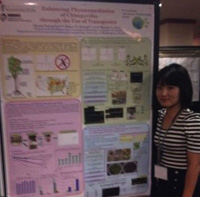
A version of this story was originally published in the Spring 2014 UW SRP eBulletin.
Keum Young Lee, a Superfund Research Program Trainee at the University of Washington School of Environmental and Forest Sciences, received her doctorate in December, 2013. Keum's leading-edge research has opened the door for certain long-lived tree species to be considered as viable field study candidates for chlorpyrifos phytoremediation. Phytoremediation is the use of plants to clean up contaminated soil. Keum worked in Sharon Doty's lab (UW-SRP Project 5) to explore the ability of willow and poplar plants to metabolize and remove the pesticide chlorpyrifos from a plant mineral nutrient solution in the laboratory. The experiment explored toxicity along with the plant's ability to uptake chlorpyrifos and determine its ability to metabolize the chemical.
Chlorpyrifos was developed to control soil borne insects that damage crops and has been used around the world. Although the pesticide has been restricted from residential use, it is still employed in agricultural production in the United States. The Environmental Protection Agency (EPA) and the Agency for Toxic Substances and Disease Registry (ATSDR) tell us that Chlorpyrifos is considered a significant threat to human health that includes poisoning, human birth defects and effects on male infertility. For agencies that protect the environment and our health, finding effective means for removing chlorpyrifos from soils is important. (To learn more about EPA's interest in phytoremediation and related technologies click here.) The results of her dissertation, Phytoremediation of Chlorpyrifos Insecticide: The Use of Woody Plants and Transgenics to Enhance and Understand the Uptake, Translocation, and Transformation of Chlorpyrifos, show that phytoremediation of this pesticide may be possible using willow and poplar trees, which are fast growing species.
Keum has long been committed to making a positive difference in the health of the environment. Her previous research on enhancing phytoremediation via the use of transgenic plants was awarded honors at the ‘International Phytotechnology Society’s Eighth Conference’ in 2011. Keum’s next career steps will draw her outside the realm of academic research, allowing her to actively apply her knowledge as an environmental scientist in the Pacific Northwest.

